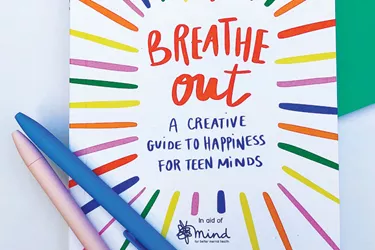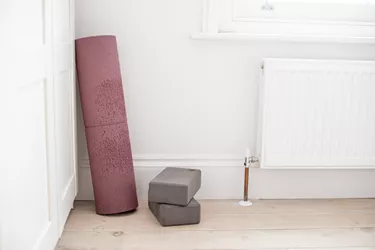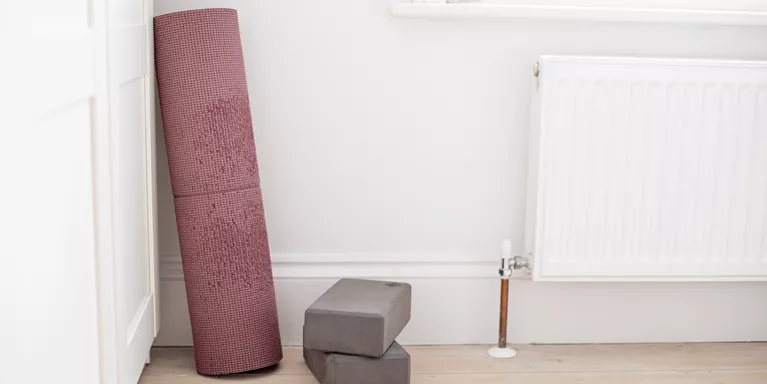A diary of mindfulness, week seven - taking care of yourself
In the seventh in her series on mindfulness and depression, Clare blogs about looking out for the early signs of a low period, and how small actions can help to lift your mood.
< Read about week 6 or Read about week 8 >
I've been writing a diary of my experiences of an eight week Mindfulness Based Cognitive Therapy (MBCT) course. You can see a list of the themes for the weeks, and a link to weeks one to six on my blog.
I felt like the second half of the course was getting more practical - and I think this is reflected in this diary. We’ve been focusing more on ideas in these latter blogs, and less on the meditation practice we did and how that worked.
This is not to say that we were moving away from regular meditation and breathing space. All the work in the latter part of the course is based on using these skills and these skills take ongoing practice. Each week we started and finished with a long meditation and our homework each week included regular breathing spaces as well as a longer meditation each day.
Although I didn’t manage to do the homework as much as I should, I was definitely finding that I was generally more able to look at my mind and its behaviour ‘at a distance’. I also regularly found myself stopping to experience something in the moment, rather than living on autopilot so much. As the instructors hoped, by regular practice, we were starting to find a more mindful approach to life was becoming slowly more embedded in our day to day lives.

Taking action
In week seven, the emphasis was also on taking action in our lives to take care of ourselves. After all, although mindfulness is the emphasis in MBCT, it is also based in cognitive behavioural therapy (CBT) which is a very action oriented approach to managing depression. CBT therapists recognise that depression can cause reverse motivation. Usually we want to do something and then we do it. When depressed we sometimes have to do something in order to want to do it - the motivation comes second.
I really like this way of putting it. I know that sometimes I end up feeling better by making myself put one foot in front of the other and doing something that initially I really don’t want to do - often exercise, visiting friends or getting to work. However it can be hard to encourage others to do this, even when you know it would help them - and equally hard to persuade myself when in a very low mood.
In the session today we didn’t just have to think about what helps when you feel bad, but what actively makes us feel good. We were asked to break down our day into small parts and activities and identify what helps us feel good, nourishes us and increases our sense of being alive and present. We also had to identify what drains us and does the opposite. Have a go. I found that the homework we had done in the past on identifying pleasant and unpleasant events really helped here.
I’ve spoken a bit about the things that help me feel good before, they include writing and sharing my writing, sewing, gardening or just being outside in the green, stroking the cat, reading in the bath, talking to friends, my first cup of coffee at work and my tea in bed in the morning, exercise, volunteering and playing with children, thinking and solving problems, reading in bed, sitting down for dinner, learning new things, communicating and working with the young people who use our services at TheSite.org and completing work to mine, and others, satisfaction.
And, for balance, some of the things that drain me include having to do work I don’t believe in, getting into arguments with people who argue irrationally, feeling powerless, feeling bored, when I don’t feel useful or purposeful, when technical or mechanical things break or need fixing, spending too long inside or in a city environment, being alone for too long, analysing my food and weight and drinking alcohol.
After we have started to identify these activities, we can start to consciously choose to increase the time given to the ‘up’ activities and decrease the time given to ‘down’ activities. We can do this in our daily lives - but also start to discover activities that we can use as tools when we do have periods of worsening mood. With awareness that depression can cause this reverse motivation which in turn can cause thoughts such as ‘this is pointless’ or ‘I can’t be bothered’ we are also more likely to persist with up activities even in the face of these negative thoughts.
Using the breathing space
Bringing awareness to the breath is, as always, our first response to unpleasant experiences. We change our relationship to the experience through approach and acceptance. We may choose to focus on our thoughts as in the last session or we may choose to take some considered action. We can ask ourselves: "What do I need for myself right now? How can I best take care of myself right now? These feelings are happening now, but won’t be there always - what can I do for myself to help me get through this low period?"
In the session, the leader suggested three types of activities that can be useful for depressed feelings - doing something pleasurable, doing something that gives you a sense of satisfaction or just focusing your attention on exactly what you are doing right now. All these are things that depression can undermine and stop you from doing.
One of the things our leader emphasised was that we shouldn’t expect miracles, put extra pressure on ourselves or expect that we should feel a certain way afterwards. The best way is to try and do something as an experiment, to see if it might help. Things might not change dramatically but taking some action can help you feel that you are maintaining some control.
Creating an early warning system – preventing relapse
The next part of the session was another practical task for us. We had to try and create our own early warning system, thinking about the sort of changes that, for us, might show that depression is trying to take hold again.
For me, these are things like feeling irritable, postponing social engagements, eating too much in an ‘out of control’ way, sleeping worse and wanting to go to bed in the day, feeling as though I am behind a glass wall or in a fog, feeling my thoughts are running ‘wild’, and getting very emotional at small things.
These are things that we can suggest that family, friends or partners look out for too - to help us notice and respond to these signs in a better way. One of the reasons for involving other people is that, as we all know, part of the hardest parts of depression is that as it hits we stop feeling as though anything can help, and start feeling that heeding the signs is pointless.
We need to be able to make sure that, when we are in a positive frame of mind, we can set up systems to encourage us when we are in a depressed one.
Writing things down is an obvious one - we were encouraged to make a list of these early warning signals which we could pin on the wall, for ourselves or for our partners/families too. We added to this some of the actions we could take that we know can help. To overcome the way depression can stop us doing anything to help ourselves we were also encouraged to speak to the frame of mind we would be in at the time - writing things like: "I know you probably don’t feel much like doing this right now, but please do try and give it a go anyway."
We also included some suggestions for actions to take when our mood changes without any warning, and feeling low came out of the blue - such as taking the breathing space and using it to work out what actions might help us look after ourselves. It felt very positive to be combining the meditative and learning side of the course with some possibilities for practical action. By joining the two together it felt more likely that both elements would more easily deeply embedded in my day to day life and management of my mind.
Next week would be the final session. It would be a summarising and rounding up session called ‘Using what we’ve learnt to help us deal with future moods’.


Information and support
When you’re living with a mental health problem, or supporting someone who is, having access to the right information - about a condition, treatment options, or practical issues - is vital. Visit our information pages to find out more.
Share your story with others
Blogs and stories can show that people with mental health problems are cared about, understood and listened to. We can use it to challenge the status quo and change attitudes.

















